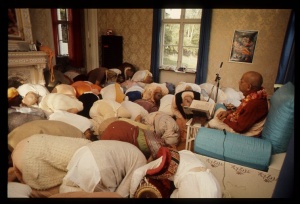SB 9.11.31-34: Difference between revisions
m (1 revision(s)) |
No edit summary |
||
| Line 1: | Line 1: | ||
{{info | {{info | ||
|speaker= | |speaker=Śukadeva Gosvāmī | ||
|listener=King | |listener=King Parīkṣit | ||
}} | }} | ||
[[Category:Srimad-Bhagavatam - Canto 09 Chapter 11]] | |||
[[Category:Bhagavatam Verses Spoken by Sukadeva Gosvami - Vanisource|091131]] | |||
<div style="float:left">'''[[Srimad-Bhagavatam]] - [[SB 9|Ninth Canto]] - [[SB 9.11: Lord Ramacandra Rules the World|Chapter 11: Lord Rāmacandra Rules the World]]'''</div> | |||
<div style="float:right">[[File:Go-previous.png|link=SB 9.11.30]] '''[[SB 9.11.30]] - [[SB 9.11.35]]''' [[File:Go-next.png|link=SB 9.11.35]]</div> | |||
{{RandomImage}} | |||
==== TEXTS 31-34 ==== | ==== TEXTS 31-34 ==== | ||
<div | <div class="verse"> | ||
atha praviṣṭaḥ sva-gṛhaṁ | :atha praviṣṭaḥ sva-gṛhaṁ | ||
juṣṭaṁ svaiḥ pūrva-rājabhiḥ | :juṣṭaṁ svaiḥ pūrva-rājabhiḥ | ||
anantākhila-koṣāḍhyam | :anantākhila-koṣāḍhyam | ||
anarghyoruparicchadam | :anarghyoruparicchadam | ||
vidrumodumbara-dvārair | |||
vaidūrya-stambha-paṅktibhiḥ | :vidrumodumbara-dvārair | ||
sthalair mārakataiḥ svacchair | :vaidūrya-stambha-paṅktibhiḥ | ||
bhrājat-sphaṭika-bhittibhiḥ | :sthalair mārakataiḥ svacchair | ||
citra-sragbhiḥ paṭṭikābhir | :bhrājat-sphaṭika-bhittibhiḥ | ||
vāso-maṇi-gaṇāṁśukaiḥ | |||
muktā-phalaiś cid-ullāsaiḥ | :citra-sragbhiḥ paṭṭikābhir | ||
kānta-kāmopapattibhiḥ | :vāso-maṇi-gaṇāṁśukaiḥ | ||
dhūpa-dīpaiḥ surabhibhir | :muktā-phalaiś cid-ullāsaiḥ | ||
maṇḍitaṁ puṣpa-maṇḍanaiḥ | :kānta-kāmopapattibhiḥ | ||
strī-pumbhiḥ sura-saṅkāśair | |||
juṣṭaṁ bhūṣaṇa-bhūṣaṇaiḥ | :dhūpa-dīpaiḥ surabhibhir | ||
:maṇḍitaṁ puṣpa-maṇḍanaiḥ | |||
:strī-pumbhiḥ sura-saṅkāśair | |||
:juṣṭaṁ bhūṣaṇa-bhūṣaṇaiḥ | |||
</div> | </div> | ||
| Line 29: | Line 37: | ||
==== SYNONYMS ==== | ==== SYNONYMS ==== | ||
<div | <div class="synonyms"> | ||
''atha''—thereafter; ''praviṣṭaḥ''—He entered; ''sva-gṛham''—His own palace; ''juṣṭam''—occupied; ''svaiḥ''—by His own family members; ''pūrva-rājabhiḥ''—by the previous members of the royal family; ''ananta''—unlimited; ''akhila''—everywhere; ''koṣa''—treasury; ''āḍhyam''—prosperous; ''anarghya''—priceless; ''uru''—high; ''paricchadam''—paraphernalia; ''vidruma''—of coral; ''udumbara-dvāraiḥ''—with the two sides of the doors; ''vaidūrya-stambha''—with pillars of ''vaidūrya-maṇi''; ''paṅktibhiḥ''—in a line; ''sthalaiḥ''—with floors; ''mārakataiḥ''—made of ''marakata'' stone; ''svacchaiḥ''—very cleanly polished; ''bhrājat''—dazzling; ''sphaṭika''—marble; ''bhittibhiḥ''—foundations; ''citra-sragbhiḥ''—with varieties of flower garlands; ''paṭṭikābhiḥ''—with flags; ''vāsaḥ''—clothing; ''maṇi-gaṇa-aṁśukaiḥ''—by various effulgent and valuable stones; ''muktā-phalaiḥ''—with pearls; ''cit-ullāsaiḥ''—increasing celestial pleasure; ''kānta-kāma''—fulfilling one's desires; ''upapattibhiḥ''—by such paraphernalia; ''dhūpa-dīpaiḥ''—with incense and lamps; ''surabhibhiḥ''—very fragrant; ''maṇḍitam''—decorated; ''puṣpa-maṇḍanaiḥ''—by bunches of various flowers; ''strī-pumbhiḥ''—by men and women; ''sura-saṅkāśaiḥ''—appearing like the demigods; ''juṣṭam''—full of; ''bhūṣaṇa-bhūṣaṇaiḥ''—whose bodies beautified their ornaments. | |||
</div> | </div> | ||
| Line 36: | Line 44: | ||
==== TRANSLATION ==== | ==== TRANSLATION ==== | ||
<div | <div class="translation"> | ||
Thereafter, Lord Rāmacandra entered the palace of His forefathers. Within the palace were various treasures and valuable wardrobes. The sitting places on the two sides of the entrance door were made of coral, the yards were surrounded by pillars of vaidūrya-maṇi, the floor was made of highly polished marakata-maṇi, and the foundation was made of marble. The entire palace was decorated with flags and garlands and bedecked with valuable stones, shining with a celestial effulgence. The palace was fully decorated with pearls and surrounded by lamps and incense. The men and women within the palace all resembled demigods and were decorated with various ornaments, which seemed beautiful because of being placed on their bodies. | Thereafter, Lord Rāmacandra entered the palace of His forefathers. Within the palace were various treasures and valuable wardrobes. The sitting places on the two sides of the entrance door were made of coral, the yards were surrounded by pillars of vaidūrya-maṇi, the floor was made of highly polished marakata-maṇi, and the foundation was made of marble. The entire palace was decorated with flags and garlands and bedecked with valuable stones, shining with a celestial effulgence. The palace was fully decorated with pearls and surrounded by lamps and incense. The men and women within the palace all resembled demigods and were decorated with various ornaments, which seemed beautiful because of being placed on their bodies. | ||
</div> | </div> | ||
__NOTOC__ | |||
<div style="float:right; clear:both;">[[File:Go-previous.png|link=SB 9.11.30]] '''[[SB 9.11.30]] - [[SB 9.11.35]]''' [[File:Go-next.png|link=SB 9.11.35]]</div> | |||
__NOTOC__ | |||
__NOEDITSECTION__ | |||
Revision as of 08:54, 16 May 2021

A.C. Bhaktivedanta Swami Prabhupada
TEXTS 31-34
- atha praviṣṭaḥ sva-gṛhaṁ
- juṣṭaṁ svaiḥ pūrva-rājabhiḥ
- anantākhila-koṣāḍhyam
- anarghyoruparicchadam
- vidrumodumbara-dvārair
- vaidūrya-stambha-paṅktibhiḥ
- sthalair mārakataiḥ svacchair
- bhrājat-sphaṭika-bhittibhiḥ
- citra-sragbhiḥ paṭṭikābhir
- vāso-maṇi-gaṇāṁśukaiḥ
- muktā-phalaiś cid-ullāsaiḥ
- kānta-kāmopapattibhiḥ
- dhūpa-dīpaiḥ surabhibhir
- maṇḍitaṁ puṣpa-maṇḍanaiḥ
- strī-pumbhiḥ sura-saṅkāśair
- juṣṭaṁ bhūṣaṇa-bhūṣaṇaiḥ
SYNONYMS
atha—thereafter; praviṣṭaḥ—He entered; sva-gṛham—His own palace; juṣṭam—occupied; svaiḥ—by His own family members; pūrva-rājabhiḥ—by the previous members of the royal family; ananta—unlimited; akhila—everywhere; koṣa—treasury; āḍhyam—prosperous; anarghya—priceless; uru—high; paricchadam—paraphernalia; vidruma—of coral; udumbara-dvāraiḥ—with the two sides of the doors; vaidūrya-stambha—with pillars of vaidūrya-maṇi; paṅktibhiḥ—in a line; sthalaiḥ—with floors; mārakataiḥ—made of marakata stone; svacchaiḥ—very cleanly polished; bhrājat—dazzling; sphaṭika—marble; bhittibhiḥ—foundations; citra-sragbhiḥ—with varieties of flower garlands; paṭṭikābhiḥ—with flags; vāsaḥ—clothing; maṇi-gaṇa-aṁśukaiḥ—by various effulgent and valuable stones; muktā-phalaiḥ—with pearls; cit-ullāsaiḥ—increasing celestial pleasure; kānta-kāma—fulfilling one's desires; upapattibhiḥ—by such paraphernalia; dhūpa-dīpaiḥ—with incense and lamps; surabhibhiḥ—very fragrant; maṇḍitam—decorated; puṣpa-maṇḍanaiḥ—by bunches of various flowers; strī-pumbhiḥ—by men and women; sura-saṅkāśaiḥ—appearing like the demigods; juṣṭam—full of; bhūṣaṇa-bhūṣaṇaiḥ—whose bodies beautified their ornaments.
TRANSLATION
Thereafter, Lord Rāmacandra entered the palace of His forefathers. Within the palace were various treasures and valuable wardrobes. The sitting places on the two sides of the entrance door were made of coral, the yards were surrounded by pillars of vaidūrya-maṇi, the floor was made of highly polished marakata-maṇi, and the foundation was made of marble. The entire palace was decorated with flags and garlands and bedecked with valuable stones, shining with a celestial effulgence. The palace was fully decorated with pearls and surrounded by lamps and incense. The men and women within the palace all resembled demigods and were decorated with various ornaments, which seemed beautiful because of being placed on their bodies.